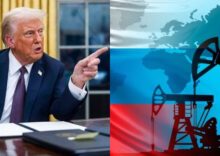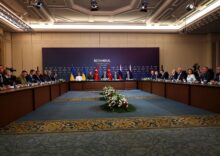The conflict between Iran and Israel has made it more challenging for the EU to lower the price cap on Russian oil.


Last week, the European Commission included a proposal in the draft of its Russian sanctions package to lower the price cap on oil from the current $60 per barrel to $45. Some member states that support the cap are worried that the proposal may lack the necessary unanimous backing from EU governments without support from the US.
A group of EU countries voiced concerns about the price cut during a meeting of ambassadors in Brussels. Several countries also highlighted the importance of coordinating with the G7, suggesting a hesitation to act without the US’ involvement. The recent increase in oil prices has made it challenging for the EU to take action alongside other G7 partners without support from the US. The EU’s initiatives, backed by the UK, aim to diminish Russia’s income from oil sales, which the Kremlin utilizes to fund its war in Ukraine.
Although oil prices fell below the G7 limit in recent months, they have surged sharply following the Israeli strikes on Iran.







